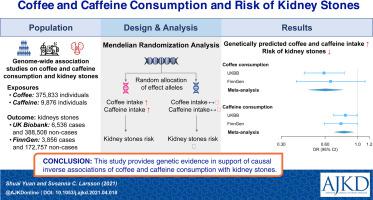American Journal of Kidney Diseases ( IF 9.4 ) Pub Date : 2021-10-21 , DOI: 10.1053/j.ajkd.2021.04.018 Shuai Yuan 1 , Susanna C Larsson 2

|
Rationale & Objective
Coffee and caffeine consumption have been associated with a lower risk of kidney stones in observational studies. We conducted a Mendelian randomization study to assess the causal nature of these associations.
Study Design
Mendelian randomization analysis.
Setting & Participants
Independent genetic variants associated with coffee and caffeine consumption at the genome-wide significance level were selected from previously published meta-analyses as instrumental variables. Summary-level data for kidney stones were obtained from the UK Biobank study (6,536 cases and 388,508 noncases) and the FinnGen consortium (3,856 cases and 172,757 noncases).
Exposure
Genetically predicted coffee and caffeine consumption.
Outcome
Clinically diagnosed kidney stones.
Analytical Approach
Mendelian randomization methods were used to calculate causal estimates. Estimates from the 2 sources were combined using the fixed-effects meta-analysis methods.
Results
Genetically predicted coffee and caffeine consumption was associated with a lower risk of kidney stones in the UK Biobank study, and the associations were directionally similar in the FinnGen consortium. The combined odds ratio of kidney stones was 0.60 (95% CI, 0.46-0.79; P < 0.001) per a genetically predicted 50% increase in coffee consumption and 0.81 (95% CI, 0.69-0.94; P = 0.005) per a genetically predicted 80-mg increase in caffeine consumption.
Limitations
Genetic influence on kidney stone risk via pathways not involving coffee or caffeine.
Conclusions
Using genetic data, this study provides evidence that higher coffee and caffeine consumption may cause a reduction in kidney stones.
中文翻译:

咖啡和咖啡因摄入与肾结石风险:孟德尔随机研究
基本原理和目标
在观察性研究中,咖啡和咖啡因的摄入与肾结石风险降低有关。我们进行了一项孟德尔随机化研究,以评估这些关联的因果性质。
学习规划
孟德尔随机化分析。
设置与参与者
在全基因组显着性水平上与咖啡和咖啡因消费相关的独立遗传变异选自先前发表的荟萃分析作为工具变量。肾结石的汇总数据来自英国生物银行研究(6,536 例和 388,508 例非病例)和 FinnGen 联盟(3,856 例和 172,757 例非病例)。
暴露
从基因上预测咖啡和咖啡因的摄入量。
结果
临床诊断为肾结石。
分析方法
孟德尔随机化方法用于计算因果估计。使用固定效应荟萃分析方法合并来自 2 个来源的估计值。
结果
在英国生物银行研究中,基因预测的咖啡和咖啡因消费与肾结石风险较低有关,并且在 FinnGen 财团中,这种关联在方向上是相似的。肾结石的综合优势比为 0.60 (95% CI, 0.46-0.79; P < 0.001) 每一个基因预测咖啡消费量增加 50% 和 0.81 (95% CI, 0.69-0.94; P = 0.005) 每一个基因预计咖啡因摄入量增加 80 毫克。
限制
通过不涉及咖啡或咖啡因的途径对肾结石风险的遗传影响。
结论
使用遗传数据,这项研究提供了证据,表明较高的咖啡和咖啡因摄入量可能会导致肾结石减少。











































 京公网安备 11010802027423号
京公网安备 11010802027423号